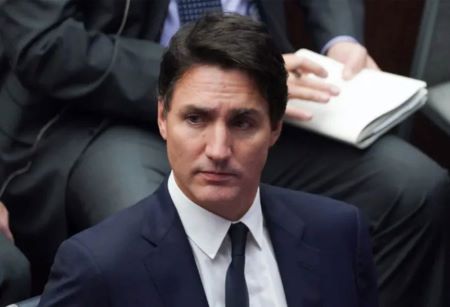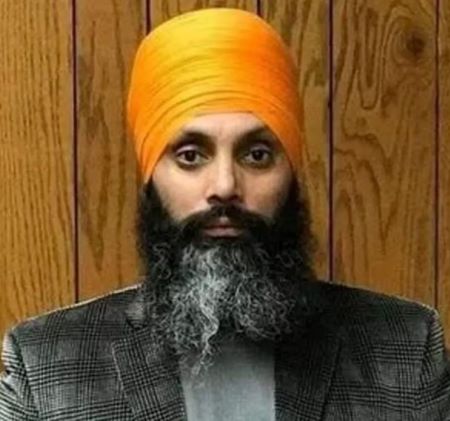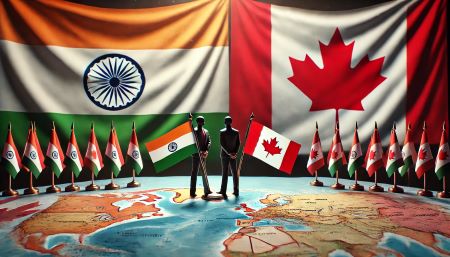As tensions rise between India and Canada, both countries have expelled diplomats, threatening their economic ties and international standing.
THE DIPLOMATIC RIFT between Canada and India over the assassination of Hardeep Singh Nijjar, a Canadian citizen and prominent Sikh separatist leader, has intensified significantly in recent months. Nijjar, an advocate for an independent Sikh state (Khalistan), was gunned down in June 2023 outside a Sikh temple in Surrey, British Columbia. His death has since become the centre of an international political storm.

Justin Trudeau
The Canadian government, led by Prime Minister Justin Trudeau, took a dramatic step by expelling six Indian diplomats after first declaring them ‘persons of interest’ and requesting India to lift their diplomatic immunity.
This request was aimed at allowing Canadian authorities to interrogate the diplomats regarding their alleged involvement in Nijjar’s murder. India, in retaliation, expelled six Canadian diplomats, further heightening tensions between the two nations.
Prime Minister Trudeau’s announcement in the Canadian Parliament, where he revealed that Canadian security agencies had credible evidence implicating Indian government officials in the assassination, set off a cascade of reactions. He emphasized that Canada was not making accusations lightly but was acting based on substantial intelligence reports.
However, the Indian government promptly rejected the allegations as “absurd” and “motivated,” suggesting that Trudeau was playing to domestic political constituencies, particularly the Sikh community, in the run-up to Canada’s parliamentary elections.
The situation became more controversial when reports surfaced in The Washington Post—a highly respected American newspaper—that Canada had evidence linking India’s Home Minister, Amit Shah, to the authorization of Nijjar’s killing.

Hardeep Singh Nijjar
This claim, though not officially confirmed, has fuelled further speculation and outrage, particularly within the Sikh diaspora and international diplomatic circles.
The fallout from these allegations is not just diplomatic but also economic. Indo-Canadian trade, which amounts to billions of dollars annually, now faces the possibility of severe disruption.
Several industries in both countries rely heavily on stable trade relations, and any prolonged diplomatic conflict could have far-reaching economic consequences, particularly for India.
In the wake of these developments, several key international players, including the United States, the United Kingdom, Australia, and New Zealand, have expressed concerns over the escalating tensions. They have urged India to cooperate fully with the Canadian investigation to ensure a transparent and fair resolution.
Despite these calls, the Indian government has remained defiant, refusing to participate in what it considers a politically motivated inquiry.
During my interview with the distinguished journalist Neelu Vyas (starting at 19 minutes, 40 seconds into the conversation), I weighed in on the matter.
My position was clear: if the Indian government, including Mr. Amit Shah, truly has nothing to conceal, and if their conscience is clean (daaman saaf hai), they should welcome an investigation rather than dismissing it outright. After all, a thorough investigation would clarify everything—sab doodh ka doodh aur paani ka paani ho jayega (i.e., the truth will come out).

Narendra Modi
That said, any investigation must be carried out by a credible, neutral international body, such as the International Court of Justice or an impartial agency appointed by the United Nations. Only an organization of this caliber—widely respected for its integrity and impartiality—can ensure a fair, unbiased inquiry.
This would demonstrate a mature and responsible approach to resolving the issue. On the other hand, India’s reluctance to cooperate may lead to suspicions that ‘daal mein kuch kaala hai’ (i.e., there is something to hide).
Beyond the diplomatic and political repercussions, India also faces significant reputational risks on the global stage. As an emerging economic power and an influential voice in world politics, India cannot afford to be seen as obstructing justice or disregarding international norms.
Failing to address this issue in a timely and transparent manner could severely damage India’s standing within the international community.
 Moreover, the broader implications of this dispute extend to the Sikh diaspora, particularly in Canada, the UK, and the United States, where the Khalistan movement continues to have support.
Moreover, the broader implications of this dispute extend to the Sikh diaspora, particularly in Canada, the UK, and the United States, where the Khalistan movement continues to have support.
A mishandling of the situation could further inflame tensions between the Indian government and Sikh activists worldwide, leading to potential unrest and an erosion of trust between India and its allies.
In summary, this dispute between Canada and India over Hardeep Singh Nijjar’s murder has the potential to disrupt not only diplomatic relations but also the economic, social, and political ties between these two countries.
Also Read: Diplomatic Deadlock: The Fallout of Canada-India Tensions and Its Impact on Citizens
It is imperative for India to consider a cooperative and transparent approach, engaging with international stakeholders to resolve the issue quickly, and agree to an investigation by a reputed, neutral and impartial body, so that the truth may be known to all. Failing to do so could result in far-reaching consequences, including damage to its trade, its diplomatic relationships, and its prestige in the global community. ![]()
Disclaimer : PunjabTodayNews.com and other platforms of the Punjab Today group strive to include views and opinions from across the entire spectrum, but by no means do we agree with everything we publish. Our efforts and editorial choices consistently underscore our authors’ right to the freedom of speech. However, it should be clear to all readers that individual authors are responsible for the information, ideas or opinions in their articles, and very often, these do not reflect the views of PunjabTodayNews.com or other platforms of the group. Punjab Today does not assume any responsibility or liability for the views of authors whose work appears here.
Punjab Today believes in serious, engaging, narrative journalism at a time when mainstream media houses seem to have given up on long-form writing and news television has blurred or altogether erased the lines between news and slapstick entertainment. We at Punjab Today believe that readers such as yourself appreciate cerebral journalism, and would like you to hold us against the best international industry standards. Brickbats are welcome even more than bouquets, though an occasional pat on the back is always encouraging. Good journalism can be a lifeline in these uncertain times worldwide. You can support us in myriad ways. To begin with, by spreading word about us and forwarding this reportage. Stay engaged.
— Team PT

